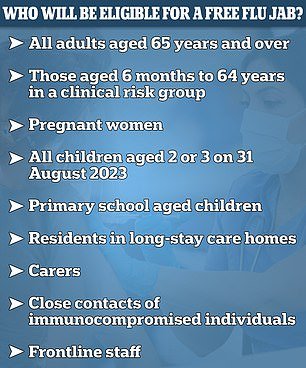Women are more likely than men to suffer from reactions such as fever, headache and a sore arm after receiving the flu shot.
Side effects after a flu vaccination are more common in women, whose immune systems may respond more strongly.
Researchers analyzed data from more than 34,000 people who participated in 18 scientific studies of reactions to flu shots.
Among the over-65s, the largest group to get the flu jab in Britain, women were 43 percent more likely than men to develop problems in the arm they were injected into, such as pain or swelling.
In this age group, women were also 27 percent more likely to experience a ‘systemic reaction’ such as fever, muscle aches or headaches – all of which were individually more common in women than men.
Researchers analyzed data from more than 34,000 people who participated in 18 scientific studies of reactions to flu shots. Among the over-65s, the largest group to get the flu jab in Britain, women were 43 percent more likely than men to develop problems in the arm they were injected into, such as pain or swelling.


In an effort to ‘get back to normal’, invitations are not being extended to millions between the ages of 50 and 64 who were eligible during the pandemic
Women under the age of 65 were also more likely than men to suffer from side effects from the flu shot.
Younger people, such as pregnant women and people with certain health conditions, are offered the vaccination by the NHS every winter.
Dr. Marilou Kiely, who led the study at the University of Montreal, said: ‘We found that women are more likely than men to respond to the flu shot, regardless of their age or the type of flu vaccine they received.
‘However, the risk of these reactions to the flu shot decreases as people get older, in both women and men.
‘Women should keep in mind that these reactions after vaccination are usually mild and get better on their own – as well as the potential benefits of the flu vaccine, which is more important for vulnerable people, such as those who are older or already have certain diseases. health conditions.’
The study, published in the Journal of Epidemiology & Community Health, found that pain was the most common problem in the arm of people who got the flu shot.
Muscle pain and headaches were the most common reactions affecting the entire body.
The greater likelihood of these types of body reactions in women would not affect many people – only 74 more women than men for every 1,000 people vaccinated, the researchers calculate.
But women may also be more likely to have reactions that affect their lives, the results suggest.
Women over 65 were 51 percent more likely than men to have a more serious problem with their injected arm, making it temporarily more difficult to perform everyday activities such as household chores, for example.
They were 48 percent more likely to have a more severe reaction that affected the entire body, such as muscle pain and fever, making it more difficult to perform daily activities.
However, the difference between women and men in terms of severe body reactions was smaller in those over 65 than the difference between women and men who were younger.
Older women may have an immune system that is less responsive to the flu shot than that of younger women.
Older people generally respond less strongly to vaccines.
The analysis of studies conducted between 2010 and 2018, which looked at reactions within seven days of a flu shot, found that women were more likely than men to report reactions to flu shots, regardless of whether they received the trivalent or quadrivalent vaccine – which protects against three or four flu strains.
The study authors note that women are generally more likely to report health problems and seek help, based on previous evidence, which may also make it appear that their risk of flu shot reactions is higher than men.
The quality of evidence in the studies analyzed was also mediocre at best, meaning more research is needed.
More than 2.8 million people in England have received their flu jab since the autumn booster campaign started on September 11, according to figures from NHS England.
